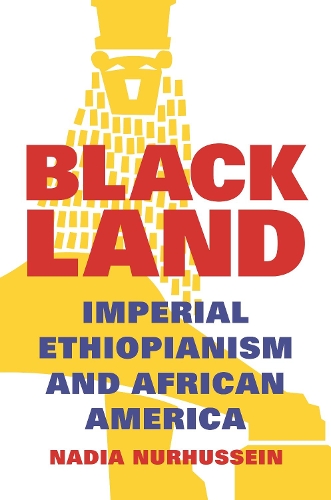
Black Land: Imperial Ethiopianism and African America
(Hardback)
Available Formats
Publishing Details
Black Land: Imperial Ethiopianism and African America
By (Author) Professor Nadia Nurhussein
Princeton University Press
Princeton University Press
25th November 2019
United States
Classifications
Tertiary Education
Non Fiction
Literature: history and criticism
History of the Americas
810.9896073
Physical Properties
Hardback
280
Width 156mm, Height 235mm
Description
The first book to explore how African American writing and art engaged with visions of Ethiopia during the late nineteenth and early twentieth centuries As the only African nation, with the exception of Liberia, to remain independent during the colonization of the continent, Ethiopia has long held significance for and captivated the imaginations of African Americans. In Black Land, Nadia Nurhussein delves into nineteenth- and twentieth-century African American artistic and journalistic depictions of Ethiopia, illuminating the increasing tensions and ironies behind cultural celebrations of an African country asserting itself as an imperial power. Nurhussein navigates texts by Walt Whitman, Paul Laurence Dunbar, Pauline Hopkins, Harry Dean, Langston Hughes, Claude McKay, George Schuyler, and others, alongside images and performances that show the intersection of African America with Ethiopia during historic political shifts. From a description of a notorious 1920 Star Order of Ethiopia flag-burning demonstration in Chicago to a discussion of the Ethiopian emperor Haile Selassie as Time magazine's Man of the Year for 1935, Nurhussein illuminates the growing complications that modern Ethiopia posed for American writers and activists. American media coverage of the African nation exposed a clear contrast between the Pan-African ideal and the modern reality of Ethiopia as an antidemocratic imperialist state: Did Ethiopia represent the black nation of the future, or one of an inert and static past Revising current understandings of black transnationalism, Black Land presents a well-rounded exploration of an era when Ethiopia's presence in African American culture was at its height.
Reviews
"Winner of the MSA Book Prize, Modernist Studies Association"
"Finalist for the Pauli Murray Book Prize, African American Intellectual History Society"
"Shortlisted for the MAAH Stone Book Award, Museum of African American History"
"Nurhussein writes with clarity and critical precision about the significance and ironies of the singular position Ethiopia occupies in the diasporic imagination."---Hannah Giorgis, The Guardian
"Sophisticated, compelling and beautifully produced work."---Christian Christian Hogsbjerg, Connections
"[An] intellectual revelation"---Hannah Giorgis, The Guardian
"
[Black Land] provides readers with a fresh insight into the symbolism in political discourse. The book is
informative and stimulating with rich historical references and their profound analyses. . . . A useful publication, which will benefit college level students as well as mainstream researchers on the history of the Horn of Africa and, indeed, the general reader.
"This is a richly textured and deeply persuasive book. Black Land intervenes and contributes to understandings of Black internationalism and diaspora, empire, militarism, periodicals, and Orientalism, as well as fashion, gender, and race."---Elizabeth M. Sheehan, The Space Between: Literature and Culture 1914-1945
Author Bio
Nadia Nurhussein is associate professor of English and Africana studies at Johns Hopkins University. She is the author of Rhetorics of Literacy: The Cultivation of American Dialect Poetry.
